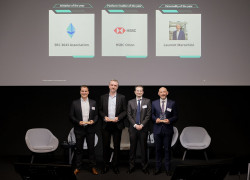Chief Audit Executives cite skill gaps and lack of impact and influence as key concerns according to new Deloitte research report
Chief Audit Executives (CAEs) recognize that Internal Audit groups need to change, but many struggle to act on that understanding according to Deloitte Global’s new report entitled “Evolution or irrelevance? Internal Audit at a crossroads.”
The study of more than 1,200 CAEs in 29 countries and eight industry sectors represents Deloitte’s most comprehensive survey of Internal Audit1 to date. Respondents were asked to comment on their functions’ status, capabilities, activities, roles, and resources currently and over the next three to five years.
Only 28 percent of survey respondents believe that their Internal Audit groups have strong impact and influence in their organizations. In fact, 16 percent believe that their Internal Audit function has little to no impact and influence over the board of directors, executive team, and other key personnel. Yet 64 percent also believe it will be important to have strong impact and influence in their organizations over the next three to five years.
“The results are striking, as they show a discrepancy between the actual and desired impact and influence of Internal Audits,” says Laurent Berliner, Partner at Deloitte Luxembourg and Deloitte EMEA FSI Risk Advisory Leader.
“Internal Audit groups need to substantially increase their importance within their organizations to assume the critical role they should be playing in effective corporate governance. The apparent lack of impact and influence is concerning and represents a clear call to action for change.”
The study found that more than half of CAEs (57 percent) are not satisfied that their Internal Audit groups have the skills and expertise to deliver on stakeholder expectations for efficient audits, insightful reports, and effective decision-support. Only 13 percent reported being very satisfied with their groups’ skills, citing specialized information technology skills, such as cyber and cloud computing, as the most frequent skill gaps as well as data analytics.
The majority of respondents currently use analytics in fieldwork, but fewer do so in annual planning and audit scoping. Over the next three to five years, 58 percent of respondents expect to be using analytics in at least half of their audits. 37 percent expect to move to high usage—employing analytics in at least 75 percent of their audits.
The survey revealed not only gaps in the use of analytics but also stakeholders’ expectations for more forward-looking, predictive activities (e.g. risk anticipation) from Internal Audit?the kind of activities enabled by analytics.
“Making use of analytics for Internal Audits is becoming more important than ever. Our survey suggests that analytics tools are indispensable to mine the wealth of available data and to provide more useful insights into business issues and risks,” explains Laurent Berliner. “Enhancing the use of analytics techniques is one of the most urgent priorities for Internal Audit.”
Additional report highlights:
- Current use of analytics is largely at basic levels - While 86 percent of respondents use analytics, only 24 percent use them at an intermediate level and 7 percent at an advanced level. Most (66 percent) use basic, ad hoc analytics (e.g. spreadsheets) or no analytics.
- Dynamic reporting is poised to increase - Use of static text documents and presentations to communicate with stakeholders will decrease as usage of dynamic visualization tools are anticipated to increase from 7 percent to 35 percent among respondents. (Visualization tools generate heat maps, bubble charts, interactive graphs, and other easy-to-grasp representations of data.)
- Advisory services will likely expand - More than half of respondents (55 percent) expect the proportion of advisory services they provide to expand over the next three to five years.
- Innovation will drive important developments - CAEs cited risk anticipation (39 percent) and data analytics (34 percent) as the two innovations most likely to impact Internal Audit over the next three to five years.
- Reviews of strategic planning and risk management will likely increase - While about one-third of Internal Audit groups have evaluated their organization’s strategic planning process in the past three years, over half expect to do so in the next three years. In the next three years, 70 percent expect to evaluate their organization’s risk management process, up from 54 percent over the past three years.
- Alternative resourcing will likely expand - Over the next three to five years, the percentage of respondents with formal rotation programs is expected to double. The percentage with guest auditor programs will likely increase by 50 percent, and according to respondents, cosourcing will increase as well.
- Budgets will likely remain stable, which may present challenges - In a time when Internal Audit may need to make significant investments to strengthen its impact and influence, half of CAEs expect their budgets to remain stable, and another third expect them to increase somewhat. Only 10 percent expect budget decreases.
Communiqués liés
MOMENTUM 2024 drives sustainable solutions forward
Deloitte’s annual MOMENTUM Conference fosters a dynamic exchange between indus...
Deloitte announces award winners at their 2024 Digital Asset...
The widespread implementation of digital assets in Luxembourg is both examined a...
Deep dive into the depths of the PSF ecosystem with Deloitte...
With the considerable growth of the Professionals of the Financial Sector (PSF) ...
Deloitte’s new acquisition deepens its foothold in Luxembo...
The consulting firm acquired Alto Advisory’s fintech practice on 1 January 202...
Generative AI is here. Are you ready to tackle tomorrow?
Deloitte Luxembourg’s 2023 Disrupted/Disrupter Conference featured AI experts ...
Deloitte report highlights steady evolution in Luxembourg's ...
Deloitte Luxembourg’s report on Professionals of the Financial Sector (PSF) sh...
Il n'y a aucun résultat pour votre recherche







